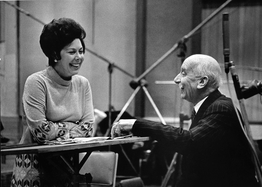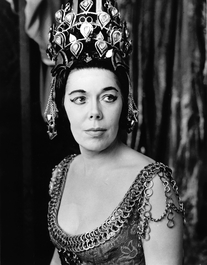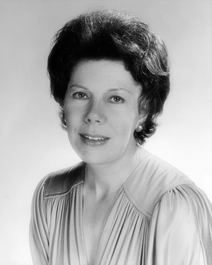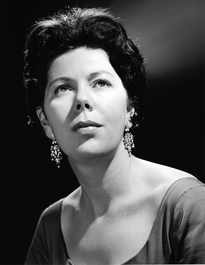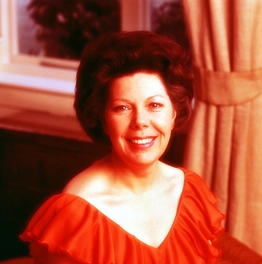Janet Baker
Sobre
A singer’s career brings many challenges, not the least of them being the balancing act involved in a professional life divided between opera and song.
Janet Baker brought it off with notable success in a career that was well-judged from start to finish. She went carefully at first, establishing herself as a concert and oratorio singer and winning special acclaim when she appeared on stage in operas by Handel. Her Covent Garden debut came in 1966 when she sang Hermia in Britten’s Midsummer Night’s Dream. Landmarks over the years have included appearances at Glyndebourne in Il ritorno d’Ulisse, her glorious Octavian in Rosenkavalier with Scottish Opera, the Cressida that William Walton rewrote with her in mind, and a foray into Italian opera with Donizetti’s Maria Stuarda.
She retired from opera after singing some wonderful performances as Gluck’s Orfeo in 1982, and from concert work a few years later. It was a durable career, and no one could say either at the outset that they heard her as a superficial artist or at the end that they heard her as a singer in decline. What they will remember instead, whether in concert or opera, is a singer whose tones were so strongly characteristic and individual that they can be recalled at will and an expressive artist who in a large and varied repertoire sang with total commitment.
One of her early and most rewarding successes abroad was the recital she gave in December 1966 in New York. It was a challenging programme: Mozart and Schubert in the first half, French song in the second. The very personal quality of her voice and art exercised an immediate appeal, and to an audience who had never heard her before put her straight away into a very special category. She has since sung in most parts of the world, always winning affection as well as praise and respect. This, moreover, is not due to any cosiness of manner, let alone indulgence in ‘crossover’. Part of her character as a singer has been an intense seriousness of dramatic commitment – it was the quality Benjamin Britten appreciated, as he demonstrated in the solo cantata Phaedra, which he wrote for her in 1976. It drew on that strong thrust of involvement we knew so well when (sometimes as a thrilling opening to a programme) she sang a dramatic Monteverdi monologue or a concert aria by Haydn.
In 1982 Janet Baker published a book called Full Circle: it was her last year as an opera singer, and the ‘circle’ which began with membership of the Glyndebourne chorus was completed with her farewell there as Gluck’s Orfeo. And there is another full circle in the art itself, for this exponent of a high culture with its commitment to the work of great composers never lost the common humanity or ability to ‘sing something simple’. After the tragic utterances of Dido (Berlioz’s or Purcell’s) and Cleopatra, you could find her singing (and be as deeply moved by) a song of Roger Quilter or a folk song such as Bushes and Briars. The thought involves, perhaps, a change of emphasis – not so much on the circularity but with gratefully appreciative rings drawn round the fullness.
Janet Baker brought it off with notable success in a career that was well-judged from start to finish. She went carefully at first, establishing herself as a concert and oratorio singer and winning special acclaim when she appeared on stage in operas by Handel. Her Covent Garden debut came in 1966 when she sang Hermia in Britten’s Midsummer Night’s Dream. Landmarks over the years have included appearances at Glyndebourne in Il ritorno d’Ulisse, her glorious Octavian in Rosenkavalier with Scottish Opera, the Cressida that William Walton rewrote with her in mind, and a foray into Italian opera with Donizetti’s Maria Stuarda.
She retired from opera after singing some wonderful performances as Gluck’s Orfeo in 1982, and from concert work a few years later. It was a durable career, and no one could say either at the outset that they heard her as a superficial artist or at the end that they heard her as a singer in decline. What they will remember instead, whether in concert or opera, is a singer whose tones were so strongly characteristic and individual that they can be recalled at will and an expressive artist who in a large and varied repertoire sang with total commitment.
One of her early and most rewarding successes abroad was the recital she gave in December 1966 in New York. It was a challenging programme: Mozart and Schubert in the first half, French song in the second. The very personal quality of her voice and art exercised an immediate appeal, and to an audience who had never heard her before put her straight away into a very special category. She has since sung in most parts of the world, always winning affection as well as praise and respect. This, moreover, is not due to any cosiness of manner, let alone indulgence in ‘crossover’. Part of her character as a singer has been an intense seriousness of dramatic commitment – it was the quality Benjamin Britten appreciated, as he demonstrated in the solo cantata Phaedra, which he wrote for her in 1976. It drew on that strong thrust of involvement we knew so well when (sometimes as a thrilling opening to a programme) she sang a dramatic Monteverdi monologue or a concert aria by Haydn.
In 1982 Janet Baker published a book called Full Circle: it was her last year as an opera singer, and the ‘circle’ which began with membership of the Glyndebourne chorus was completed with her farewell there as Gluck’s Orfeo. And there is another full circle in the art itself, for this exponent of a high culture with its commitment to the work of great composers never lost the common humanity or ability to ‘sing something simple’. After the tragic utterances of Dido (Berlioz’s or Purcell’s) and Cleopatra, you could find her singing (and be as deeply moved by) a song of Roger Quilter or a folk song such as Bushes and Briars. The thought involves, perhaps, a change of emphasis – not so much on the circularity but with gratefully appreciative rings drawn round the fullness.
Would you prefer to visit our website in English?





